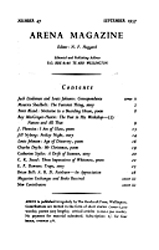MacGregor-Hastie first mentions Reed in Part 2 of his series, "The Vertical Men" (from the Auden poem, "Let us honour if we can / The vertical man, / Though we value none / But the horizontal one"):
There is little of the morbid, though a great deal of the introspective in the writing of Henry Reed, who I should have liked to have included in this article as a vertical man. However, he is at an angle of ninety degrees to himself, so I shall leave him for the Miscellaneous section of this series, and deal with Alexander Tvardovsky, a contemporary Soviet poet.The promised Reed finally arrives in Part 4, "The Great Unclassified," where MacGregor-Hastie places Reed in a European miscellany, after Alfredo Panzini, Giuseppe Ungaretti, and Joaquín de Entrambasaguas (I can only guess: MacGregor-Hastie has written "Juan de Estrembasagua"), but only after thoroughly bashing the old guard—Auden, Eliot, Stephen Spender, and C. Day-Lewis—for their complacency and selling-out:Arena, no. 46 (March 1957): 18.
In England the work of any poet who is unfortunate enough to be under thirty is ignored completely, anyway by the larger publishers; if in the nineteenth century poets had to be both famous and dead before they were owned by their families, in the twentieth century, after the pre-war flood of slim volumes of garnered fancies, publication of verse has dried up. Only the little magazines can guarantee to the dedicated poet any frequency of publication, and their solvency is not always as great as one would wish; the Listener, the New Statesman and Nation, the Times Literary Supplement—these are the major media now and only publish the sort of verse you would expect....MacGregor-Hastie's respect and appreciation for Reed is laudable, if a bit idealized: Reed, even as early as the late 1950s, was hardly remaining 'cheerful' and 'unperturbed', and he probably would have taken more than some offense at the author's rough-handling of his friends, Spender and Day-Lewis—not to mention his idols and authorities, Auden and Eliot.
There is probably only one man who remains cheerful through it all and unperturbed by the commercialism and disinterest he finds in the world of the Arts. His name is Henry Reed and he is sui generis, unclassified and unclassifiable. He published a collection of poems in 1946 called the 'Map of Verona', which established him in English Literature as perhaps the only living poet who could have written Lawrence's 'Innocent England' and write more; he published in this collection a series of poems about the war itself and the duality of experience of the sensitive soldier, his preoccupation more with the trivial detail of Army life than with the consequences to some other person's family of his firing the rifle—he is at such pains to be clean in the regulation way. In one of these poems, 'Naming of Parts' he shows his extreme sensitivity and ability to approach the emotional through the every day experiences of the world of trivia. He is being taught the names of the parts of his rifle, and the beauty of his surroundings intrudes into the lesson:
. . . . rapidly backwards and forwardsAnd that is my epilogue. The most valid commentary on this our civilisation so-called, which tries to live without the Arts, which are its flowers—
the early bees are assaulting the flowers;
They call it easing the Spring.
They call it easing the Spring: it is perfectly easy
if you have any strength in your thumb:
like the bolt and the breech and the cocking piece, and the point of balance,
which in our case we have not got; and the almond blossom
silent in all of the gardens, and the bees going backwards and forwards
For today we have naming of parts.
the point of balance
which in our case we have not got.Arena, no. 48 (March 1958): 12-13.








